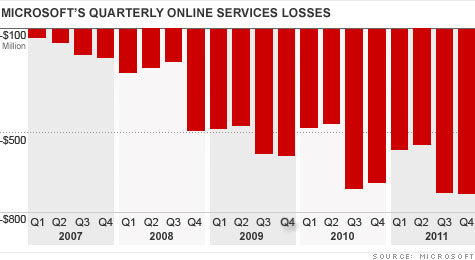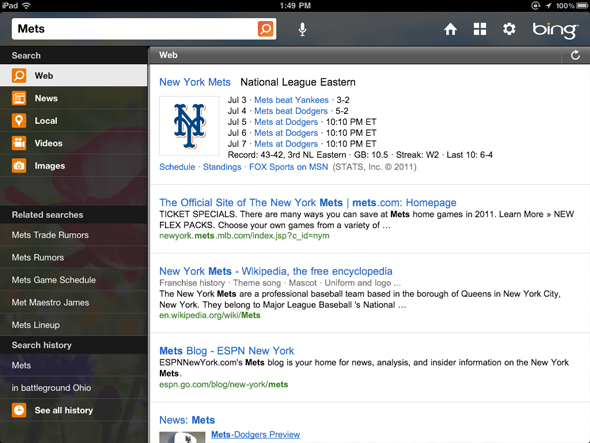Bing is not a bad search engine. I repeat: Bing is not a bad search engine. But when you’re wondering directions to a place, shopping for something new, or just curious about what this or that means, you’re likely not thinking to yourself: “Oh, I’ll Bing that.” No, no, no. You Google that sucker. Because Google is a verb. And Bing is not.
Herein lies the problem for Microsoft. Microsoft has lost $5.5 billion on Bing since its 2009 inception. Currently, losses are at about $1 billion per quarter. But wait — it gets worse. Before Bing was ever a not-quite-household name, Microsoft’s online services division had made no money whatsoever. In fact, CNN Money calculates that since Microsoft started showing off the books for that division in 2007, the company has lost a total of $9 billion.
But even with Microsoft losing billions, there’s still hope for gaining market share, right? Eh, not quite. It is true that Bing has risen from an 8.4 percent share at its launch to a current 14.7 percent market share, reports comScore. The problem is that big bad Google has lost .02 percent share during that time period, currently holding 64.8 percent of the market. So where’s all this market share coming from?
More than half of that 6.3 percent market share has come from Yahoo!. The only problem there is that Bing powers Yahoo search, so gained market share is actually just the cannibalization of a search partner. Awesome.
So to summarize, Microsoft was losing billions before Bing, continued losing billions with Bing, increased market share was only eating up its own success through a search partner, and there are no signs whatsoever that rival Google has been affected. Yeah, it’s not looking too good.
But apparently Online Services boss Qi Lu has a plan. First on the list of things to do is integrating Bing as much as possible with other Microsoft products. The partnerships with Nokia and Facebook, and the implementation of Bing search in Xbox 360 are all steps in the right direction. You see, the more use Bing gets, the better it is at intuitively searching. The end-result is meant to be something very non-Google. “We’re not trying to out-Google Google,” Lu said.
Instead, Microsoft wants Bing to be a search tool that does away with what Lu calls “caveman speak,” or the need to use prepositionless, article-free noun-based queries to find what you’re looking for. Lu wants you to ask Bing a question in natural language. From there, results will be less of a links list and more of a set of options, from which you can choose which direction to take your search.
If you’ve ever played with the Bing iPad app, you know what I’m talking about. For example, a search for “burrito” will bring up different filters than a search for “Yankees tickets.” Burrito offers up recipes, local burrito joints, along with your classic web, images, and video tabs. Yankees tickets, on the other hand, brings up the official Yankees ticketing site, along with all the different places to buy tickets with comparable pricing. In other words, Bing wants to get you what you want faster, in fewer clicks.
That’s all well and good, but Google remains a problem. Bing boss Stefan Weitz elaborated, saying, “Our challenge is that no one wakes up in the morning and says, ‘I really wish there was a better search engine,’ That’s why, for us, it’s always been about figuring out how to accomplish more than we thought was possible with a search engine. Eventually, people will expect to do more with search, and if they can’t, they’ll be disappointed.”
But again, at what point does someone hop on Google and get so disappointed with results that they say, “Maybe I should try Bing.” When I can’t find what I’m looking for on Google, I assume it’s a fault of my own query, and try try again. At no point do I pull up Bing.
Then again, once you’re used to Bing it actually has some advantages over Google, the intuitive filters I mentioned being one of them. But people have to have used it to know this, and be accustomed to it for Bing to become their go-to search engine. And if that wasn’t difficult enough, Google owns nearly all of the mobile search space, with a Google search bar built into the iOS Safari browser and a nice little Google search bar on the home screen of almost any Android device.
But let’s say, by some stroke of the imagination, Bing starts gaining more market share. Profitability is still a good ways down the road. According to analysts who spoke with CNN, Bing will need at least 25 to 30 percent of the market to start making some dough. But Weitz said that Bing has something Google doesn’t: flexibility.
When Google makes a tweak to its search, the shock waves of that minor change affect an entire ecosystem of searchers, advertisers, and sites. Google has to be extra careful as it tries to improve, so as to not confuse or scare its billions of users. Bing, on the other hand, can experiment all it wants and not risk upsetting anyone. You know, since no one really uses it.
I’m not saying Bing is a lost cause — quite the opposite. As I’ve said numerous times, Bing is a great product. But getting people to change a habit as entrenched as eating and sleeping is a more-than-daunting task. Good luck, Microsoft.

